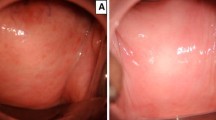Abstract
Purpose
Vulvovaginal atrophy (VVA) is a commonly reported issue among breast cancer patients, and its aetiology is multifactorial. Treatment is difficult in these women, particularly because the use of oestrogens has traditionally been discouraged. Vaginal laser treatment has been reported to improve symptoms. We aimed to assess the impact on symptoms and sexual function of vaginal laser in women with early breast cancer (EBC).
Methods
We performed a single-arm investigator initiated pilot study of female EBC patients with symptomatic VVA. A total of 3 vaginal laser treatments were administered 4 weeks apart. Questionnaires were completed at baseline, 4, 8 and 12 weeks. Our primary endpoint was symptomatic improvement of VVA at 12 weeks on 10 cm visual analogue scales. Our secondary endpoints were improvement in sexual function using the Female Sexual Function Index (FSFI) and patient-reported improvements in symptoms, sexual function and quality of life. Statistical analysis was performed with a Wilcoxon Signed Rank test.
Results
26 patients were enrolled between February 2016 and August 2017. All patients were post-menopausal, 25 of whom had received anti-oestrogen therapy for their breast cancer. Questionnaire compliance was high (98%) and all patients received the three pre-planned treatments. There was significant improvement in each of the VVA symptoms: dryness (p < 0.001), itch (p < 0.001), burning (p = 0.003), dysuria (p < 0.001) and dyspareunia (p < 0.001). Patients also reported improvement in sexual function on the FSFI (p ≤ 0.001).
Conclusions
Patients receiving vaginal laser had improvement in VVA symptoms and sexual function. Further randomised sham-controlled trials are needed to further assess this treatment.

Similar content being viewed by others
Abbreviations
- EBC:
-
Early breast cancer
- FSFI:
-
Female Sexual Function Index
- GSM:
-
Genitourinary symptoms of menopause
- HRT:
-
Hormone replacement therapy
- MCID:
-
Minimum clinically important difference
- QOL:
-
Quality of life
- SD:
-
Standard deviation
- VAS:
-
Visual analogue scale
- VHI:
-
Vaginal Health Index
- VVA:
-
Vulvovaginal atrophy
References
Mazzarello S, Hutton B, Ibrahim MFK, Jacobs C, Shorr R, Smith S, Ng T, Clemons M (2015) Management of urogenital atrophy in breast cancer patients: a systematic review of available evidence from randomized trials. Breast Cancer Res Treat 152(1):1–8. https://doi.org/10.1007/s10549-015-3434-z
Lester J, Bernhard L, Ryan-Wenger N (2012) A self-report instrument that describes urogenital atrophy symptoms in breast cancer survivors. West J Nurs Res 34(1):72–96. https://doi.org/10.1177/0193945910391483
Goodwin PJ, Ennis M, Pritchard KI, Trudeau M, Hood N (1999) Risk of menopause during the 1st year after breast cancer diagnosis. J Clin Oncol 17(8):2365–2370. https://doi.org/10.1200/jco.1999.17.8.2365
Lester J, Pahouja G, Andersen B, Lustberg M (2015) Atrophic vaginitis in breast cancer survivors: a difficult survivorship issue. J Pers Med 5(2):50–66. https://doi.org/10.3390/jpm5020050
Portman DJ, Gass ML (2014) Genitourinary syndrome of menopause: new terminology for vulvovaginal atrophy from the International Society for the Study of Women’s Sexual Health and the North American Menopause Society. Menopause 21(10):1063–1068. https://doi.org/10.1097/gme.0000000000000329
Biglia N, Bounous VE, Sgro LG, D’Alonzo M, Pecchio S, Nappi RE (2015) Genitourinary syndrome of menopause in breast cancer survivors: are we facing new and safe hopes? Clinical Breast Cancer 15(6):413–420. https://doi.org/10.1016/j.clbc.2015.06.005
Salvatore S, Nappi RE, Parma M, Chionna R, Lagona F, Zerbinati N, Ferrero S, Origoni M, Candiani M, Leone Roberti Maggiore U (2015) Sexual function after fractional microablative CO(2) laser in women with vulvovaginal atrophy. Climacteric 18(2):219–225. https://doi.org/10.3109/13697137.2014.975197
Fallowfield L, Cella D, Cuzick J, Francis S, Locker G, Howell A (2004) Quality of life of postmenopausal women in the arimidex, tamoxifen, alone or in combination (ATAC) adjuvant breast cancer trial. J Clin Oncol 22(21):4261–4271. https://doi.org/10.1200/jco.2004.08.029
Zerbinati N, Serati M, Origoni M, Candiani M, Iannitti T, Salvatore S, Marotta F, Calligaro A (2015) Microscopic and ultrastructural modifications of postmenopausal atrophic vaginal mucosa after fractional carbon dioxide laser treatment. Lasers Med Sci 30(1):429–436. https://doi.org/10.1007/s10103-014-1677-2
Salvatore S, Nappi RE, Zerbinati N, Calligaro A, Ferrero S, Origoni M, Candiani M, Leone Roberti Maggiore U (2014) A 12-week treatment with fractional CO2 laser for vulvovaginal atrophy: a pilot study. Climacteric 17(4):363–369. https://doi.org/10.3109/13697137.2014.899347
Cruz VL, Steiner ML, Pompei LM, Strufaldi R, Fonseca FLA, Santiago LHS, Wajsfeld T, Fernandes CE (2018) Randomized, double-blind, placebo-controlled clinical trial for evaluating the efficacy of fractional CO2 laser compared with topical estriol in the treatment of vaginal atrophy in postmenopausal women. Menopause 25(1):21–28. https://doi.org/10.1097/gme.0000000000000955
Pagano T, De Rosa P, Vallone R, Schettini F, Arpino G, Giuliano M, Lauria R, De Santo I, Conforti A, Gallo A, Nazzaro G, De Placido S, Locci M, De Placido G (2018) Fractional microablative CO2 laser in breast cancer survivors affected by iatrogenic vulvovaginal atrophy after failure of nonestrogenic local treatments: a retrospective study. Menopause 25(6):657–662. https://doi.org/10.1097/gme.0000000000001053
Pieralli A, Fallani MG, Becorpi A, Bianchi C, Corioni S, Longinotti M, Tredici Z, Guaschino S (2016) Fractional CO2 laser for vulvovaginal atrophy (VVA) dyspareunia relief in breast cancer survivors. Arch Gynecol Obstet 294(4):841–846. https://doi.org/10.1007/s00404-016-4118-6
Acknowledgements
Special thanks to Nina Singh and Rhonda Bignell. We would also like to thank our patients and their families.
Author information
Authors and Affiliations
Corresponding author
Ethics declarations
Conflict of interest
The authors declare that they have no conflict of interest.
Informed consent
Informed consent was obtained from all individual participants included in the study.
Research involving human participants and/or animals
This study was approved by the Adventist HealthCare Limited Human Research Ethics Committee (HREC). All procedures performed in studies involving human participants were in accordance with the ethical standards of the institutional and/or national research committee and with the 1964 Helsinki declaration and its later amendments or comparable ethical standard.
Additional information
Publisher's Note
Springer Nature remains neutral with regard to jurisdictional claims in published maps and institutional affiliations.
Rights and permissions
About this article
Cite this article
Pearson, A., Booker, A., Tio, M. et al. Vaginal CO2 laser for the treatment of vulvovaginal atrophy in women with breast cancer: LAAVA pilot study. Breast Cancer Res Treat 178, 135–140 (2019). https://doi.org/10.1007/s10549-019-05384-9
Received:
Accepted:
Published:
Issue Date:
DOI: https://doi.org/10.1007/s10549-019-05384-9




